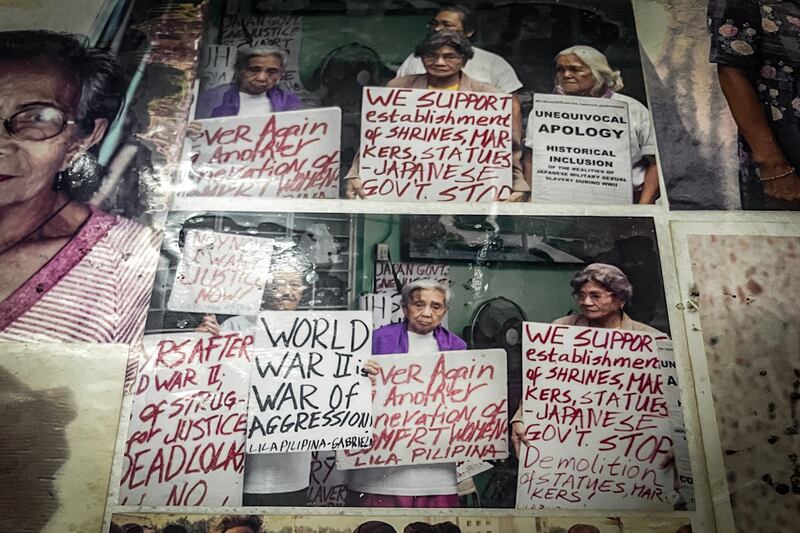Filipina Narcisa Claveria, 92, clearly recalls how her sister Meteria lost her mind after occupying Japanese turned them into sex slaves during World War II.
The soldiers took them captive and moved them to a town hall they had converted into a garrison, Claveria told BenarNews.
“There, we washed soldiers’ uniforms and ironed them, we cooked and served them dinner. We were made into servants,” she said.
“At night they raped us.”
Claveria, Meteria, hundreds of other Filipinas, and thousands of women from South Korea, Vietnam and China were forced to work as sex slaves – euphemistically called “comfort women” – for invading Japanese Imperial Army forces during World War II.
The Filipina victims didn’t get reparations after the war ended. And many across countries similarly affected have serious doubts about the sincerity of the Japanese government’s apologies in the 70 years since.
Now, as shifting geopolitics have led to increased defense ties between the Philippines and Japan, the surviving victims and their advocates believe it is time to amplify their demands.

Their cause has been taken up by Gabriela Women’s Party and two other groups represented in the Philippine Congress. The three have filed a bill to mandate that the plight of “comfort women” be recorded in history books and school textbooks and Aug. 14 be designated a national day for comfort women every year.
“We want to have a law that addresses in history the violence and atrocities the Japanese Imperial Army did to Filipina women,” Arlene Brosas, who represents Gabriela in the House of Representatives, told BenarNews.
“The Filipino people should know the life-long struggle for justice of the lolas, so history will not forget it. The bravery and the courage of the lolas will never be forgotten, that’s what is important,”
Lola is a Tagalog term for grandmother, which is how the elderly comfort women are addressed.
Brosas said the lolas would celebrate if the bill passed and became a law.
“This will be a big step forward for lolas – the validation of what happened to them, to celebrate the victory of their struggle for justice – [it] is a big thing.”
These groups also want Japan to pay compensation for its war atrocities, although that is not part of the bill.
‘It always makes me cry’
After Imperial Japan's forces invaded the archipelago in December 1941, an estimated 1,000 Filipinas were forced to become comfort women, according to written records. Most have since died of old age.
Lila Pilipina, a group set up in 1994 to give comfort women a direct voice, has documented the cases of about 174 comfort women, only 10 of whom are still alive.
Sharon Cabusao-Silva, executive director of Lila Filipina, said the victims’ demands centered mainly on an official apology, official reparation and “historical inclusion.”
“The very important fight of the lolas is the memorialization of their lives and the legacy of the women, not only as a stark reminder of how war affects young women, but also [to remind us] that wars are still very much prevalent in current times,” she told BenarNews.
In 2018, an unnamed private group decided to do just that – memorialize the comfort women.
The group installed a statue of a blindfolded woman depicted as a slave during Japanese colonial rule on the scenic Roxas Boulevard, a few meters from the Japanese embassy in Manila.
The Manila city government ordered the statue removed after three months saying it was constructing a drainage system underneath that spot, but five years later there is no sign of that project.
There is no sign of the statue either. It mysteriously disappeared.
But now, advocacy groups are determined the comfort women will be remembered and their bravery and sacrifice won’t go in vain.
The comfort women who are still alive, like 92-year-old Claveria, live with their tragic memories, while their families are haunted by their legacy.
“It always makes me cry when I remember,” Claveria said.
“I want compensation from the Japanese government.”
